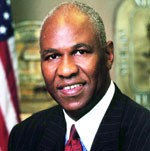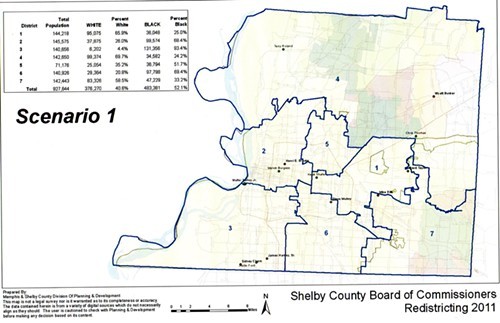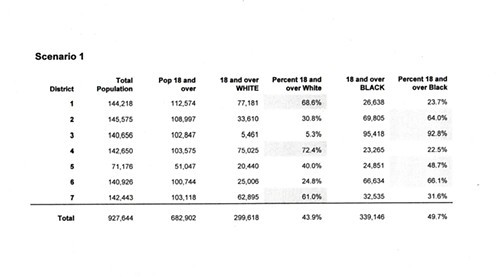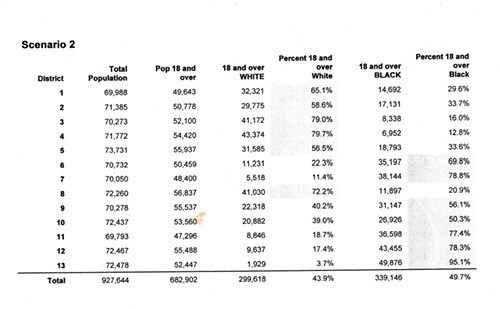Former Memphis mayor Willie Herenton was rebuffed in his bid to run charter schools in Shelby County. John Branston has more.
Month: October 2011
Herenton Will Try, Try Again
Willie Herenton’s bid for nine charter schools was turned down by the joint school board this week but the former mayor and school superintendent says he will resubmit his application in November.
“I think the review process is a healthy one,” he said. “It forced our team to be more specific in terms of our mission and instructional programs and curriculum design, which are all essential ingredients in quality schools. Overall, I feel that it is a fair process.”
Herenton is in the odd position of being an applicant getting “needs improvement” marks after 30 years in executive positions that generally put him on the other end of the process. All of the board members are familiar with his career, and many of them have had personal experience dealing with him. Add to that, there may be some reluctance on the part of the school board to expand charter schools along with other “escape hatches” while the merger is in the works.
In conjunction with Harmony Public Schools in Texas and the Cosmos Foundation, Herenton has applied to run seven charter schools in the city of Memphis in 2012-2013 and two more in the county in 2013-2014.
“At this point the county is crowded and does not have excess space,” he said. “In 2013 when the systems are merged there should be ample space.”
That remains to be seen. It is unclear how the merger will play out and how much shuffling of student populations there will be. Ultimately, that will depend partly on policy and partly — probably moreso — on how parents vote with their feet. There is already surplus space in city schools, and three elementary schools are being targeted for closure due to low enrollment and the condition of the buildings. While not wishing to appear critical of the pace of closure, Herenton noted that he closed 15 schools early in his career as superintendent.
In an interview, Herenton seemed upbeat and eager to continue the process.
“I may not be the best application writer but I know how to run good schools and get good results,” he said.
He agreed that his intial application should have been more specific.
“Their application process is highly technical,” he said. “They place a lot of value on format whereas I place value on substance of how you are going to improve academic achievement in the midst of poverty. We commenced putting our team together on the same night as the school board meeting. When we picked up the evaluation, we went to work that night with assistance from my strategic partner, Harmony Schools.”
The merger is going forward on two tracks. While the merged school board addresses charter school applications and other nuts-and-bolts matters, the separate transition team is doing research on other cities and taking a big-picture approach. The transition team meets Thursday at 4:30 p.m.
The Mason YMCA on Walker near the University of Memphis will close at the end of the year, according to an email sent to YMCA members this morning.
The organization’s board of directors made the decision to close the facility based on a cost estimate of $2.6 million for needed repairs, plus an additional $2 to $3 million to bring the facility up to current YMCA standards.
“Because the Mason Y has been a Memphis institution for more than five decades, this is a particularly tough decision, yet it is one that is prudent for maintaining the financial health of the overall YMCA of Memphis and Mid-South,” said YMCA president Keith Johnson in an email to members this morning.
Starting with next Monday, Halloween, and continuing through the rest of the holidays, the members of the Shelby County Commission will engage in a fundamental redesign. By December 31, New Year’s Eve, they must submit to the county Election Commission a district plan in conformity with the 2010 census.
Josh White of the Office of Planning and Development presented two alternatives to commissioners in committee on Wednesday. Scenario One involved 6 two-member districts with 1 single-member district, while Scenario Two prescribed 13 single-member districts. (The current proportions are 4 three-member districts and 1 single-member district.)
Both plans were calculated with an eye toward ensuring full and proportionate representation for non-Memphis residents (four members in both plans) and compliance with the Voting Right Act in ensuring African Americans the opportunity for proportionate representation (seven seas in both plans).
In the course of a brief discussion, several commissioners expressed a preference for Scenario One. Commissioners Terry Roland and Chris Thomas of what is currently District 4 and Heidi Shafer of District 1 all said that arrangement allowed for useful cooperation and shared responsibility so as to benefit both constituents and the affected commissioners.
Commissioner Steve Mulroy of District 5, at present the commission’s only representative of a single-member district, made the case for Scenario Two, citing the advantages of clearer accountability, ease of contact, and ease of campaigning. Mulroy also noted that a 13-district single-member system could be made to do double duty with districts in the new all-county school board (always presuming a court decree enabled 13 School Board districts rather than the 7 currently mandated by charter).
On the latter point, chairman Walter Bailey, chairman of the commission’s Ad Hoc Committee on Redistricting, suggested that a court decree could also waive the existing requirement for single-member School Board districts, thereby allowing the Scenario 1 dual-member system to be applied to the School Board as well.
In the end, those commissioners present voted 5-1-1 (Mulroy voting no; Sidney Chism abstaining) to submit Scenario 1 for discussion on the agenda at the commissioner’s next meeting on Monday, October 31.
Passage of a redistricting ordinance requires three readings, with the last one passing the commission by a two/thirds majority.
C-USA Picks: Week 9
An Unholy Alliance
Bruce VanWyngarden says we seem to be under minority rule these days.
The March to Madness
Frank Murtaugh previews the Memphis Tigers’ season, including interviews with players and Coach Pastner in this week’s cover story.
Songwriting life-partners Patterson Hood and Mike Cooley have released eight studio albums (along with two live albums and a couple of comps) under the Drive-By Truckers banner since their 1998 debut. Almost all are good. Some (2003’s Decoration Day; 2008’s Brighter Than Creation’s Dark) are great. In an era where the best rock bands play clubs and theaters rather than arenas, no other contemporary guitar-bass-drums unit can boast as deep or rich a catalog as these storytelling children of Neil Young, Lynyrd Skynyrd, and Tom T. Hall.
The band’s latest album, Go-Go Boots, is merely one of the good ones, a quieter collection lacking obviously major songs but boasting lots of subtle pleasures. Hood’s opening tribute to a late female relative whose glamour owned his 5-year-old imagination is simple and lovely. And he provides two tough portraits of troubled men with guns: the Vietnam vet of “Ray’s Automatic Weapon” and the human powder keg of “Used To Be a Cop.” Cooley, as always, is an indefatigable crafter of small, twisty character sketches packed with wordy comic wisdom (“Getting all excited finding nothing that was never there before is like bringing flowers to your mama and tracking dog shit all across the floor”). Here he mines “Cartoon Gold,” walks out the door to a country shuffle rhythm, and laments a girl from Pulaski, Tennessee, who hits the road for Hollywood and comes to regret it.
Expect a mix of these new songs with earlier classics like the riff-rock wisdom of Cooley’s “Marry Me” and Hood’s sardonic anthem “Let There Be Rock.” And, as if this great band weren’t enough, I don’t think they’ve ever hit town with a better opener than Tennessee indie/alt-country band Those Darlins, currently riding on their own fine sophomore album, Screws Get Loose. The Drive-By Truckers and Those Darlins play the New Daisy Theatre on Saturday, October 29th. Doors open at 7 p.m. Tickets are $26.
Election-Year Overlap
Believe it or not, the election season of 2012 is already under way, even as the last vestige of the 2011 election cycle, a November 10th runoff between Lee Harris and Kemba Ford for the District 7 seat on the Memphis City Council, has yet to run its course.
The deadline for candidate filing for Shelby County offices is December 8th, not quite a month after the District 7 runoff. County primaries will follow on March 6th (the same day as Tennessee’s presidential primary), and the county general election will be held on August 2nd.
One of the first candidates actively running is Amy Weirich, the longtime assistant district attorney general who became district attorney in her own right when her former boss, longtime district attorney Bill Gibbons, was named state Safety and Homeland Security commissioner earlier this year.
Weirich is running as a Republican, though she’s not exactly avid about the partisan aspects of her race. Her answer to a question about that after she picked up a filing petition at the downtown election commission office on Monday is worth quoting in its entirety:
“Of all of the elected positions in the county, it’s the one that’s the least partisan in terms of what we do and how we function and the way we work. We certainly do not pay attention to Republican Party agendas, Democratic Party agendas, or Tea Party agendas. We do what the people need. We do what the community asks. We are the voice of the community. Our job is to pursue the guilty and protect the innocent. We don’t honestly care what their political affiliation is or what their party affiliation is. But that [partisan elections] is the way it is in Shelby County, and so we’ve got to deal with it.”
That said, why is she running in the Republican primary rather than the Democratic primary?
“Just lifelong. I’ve always been a Republican, and it’s the party I remember. But in terms of doing a job, it really doesn’t have much to do with the functioning of the D.A.’s office.”
So far no opponent has declared against Weirich, but, as Weirich notes: “The filing deadline is December 9th [again, actually December 8th], so who knows what will happen then?”
Many people regard her as almost a prohibitive favorite. Would she agree? “I do. I’ve done a good job since January. I’ve been doing a good job for 20 years in this office, and I think I have what it takes to lead this community to the next level.”
Given the depth of Weirich’s support in Republican ranks, it is unlikely she’ll draw a serious primary opponent (though spoilers are always possible), and the Democrats have not yet fixed on a candidate. Speculation earlier this year focused on former state legislator and city council member Carol Chumney and former judicial candidate Glen Wright.
The term which Weirich and any potential opponent would be seeking is the final two years of the eight-year term to which Gibbons was elected in 2006. The full eight-year term will be up again in 2014.
• Even before the 2012 elections themselves take place in Tennessee, a war has begun over the ground rules for voting — specifically over the law, passed in the 2011 General Assembly, requiring would-be voters to present an officially recognized photo ID at their polling place.
Against a background of charges that the law was passed as part of a Republican-backed national effort to suppress turnout among likely Democratic voters, especially seniors and low-income voters, and of efforts to change the law, a series of informational events has been scheduled in Memphis, including two this week featuring Tennessee election coordinator Mark Goins.
On October 26th, Goins will appear at a joint meeting of the American Association for Retired Persons and the Aging Commission of the Mid-South at noon at 2670 Union Avenue. Later Wednesday, Goins will be on hand at the Board of Education building on Avery Street for an informational session sponsored by the League of Women Voters.
Another meeting, sponsored by the Shelby County Election Commission and featuring Tennessee Safety Driver Services director Michael Hogan, will be held in the Shelby County Commission chambers in the Vasco A. Smith Jr. Administration Building from 6 to 8 p.m. on Tuesday, November 1st.
Meanwhile, Lowe Finney and Mike Turner, the Democratic chairs of the state Senate and state House, respectively, have filed legislation to repeal the photo-ID bill, contending, in Finney’s words, “This new requirement will put hundreds of thousands of Tennesseans in danger of losing their right to vote.”
Objections to the law have focused on the difficulty and expense of acquiring photo IDs, especially for seniors, as well as on the exclusion of college IDs from eligibility.
Last week, state Safety and Homeland Security commissioner Bill Gibbons announced an agreement with 30 county clerks in Tennessee, including Shelby County clerk Wayne Mashburn, to provide free-of-charge upgraded drivers’ licenses with photos to drivers who possess drivers’ licenses without photos.
• A last-ditch effort by veteran Democratic cadre Lexie Carter and Shelby County commissioner James Harvey to rescue Planned Parenthood’s hopes for a share of Title X family-planning action in Shelby County appeared forestalled early this week when Shelby County mayor Mark Luttrell made moves to finalize a Title X contract with Christ Community Health Services.
On Monday, Luttrell signed a county commission resolution to extend such a contract, carrying with it a $397,000 federal stipend, and indicated he would sign the contract itself in short order.
Last week, after the commission voted 9-4 to approve the contract, Carter, who has held several Democratic Party offices and who co-hosts Eyes on Memphis, a weekly public-affairs program on KWAM, 990 AM, talked Harvey, one of three Democrats to vote for the CCHS contract, into using his position as someone on the prevailing side of that vote to call for a reconsideration at the commission’s next meeting on Monday, October 31st. Parliamentary procedure mandates that only someone who had previously been with the majority on a completed vote can seek such a formal reconsideration.
Four of the commission’s seven Democrats voted against the CCHS contract last Monday, either because they preferred the bid of Planned Parenthood, the traditional local provider of Title X services, on the merits or because they resisted state GOP efforts to disenfranchise Planned Parenthood, or for both reasons.
Three Democrats — Harvey, Steve Mulroy, and Justin Ford — joined the commission’s six Republicans to approve the CCHS contract. Each did so in a context of some ambivalence. Mulroy and Ford had voted the other way in a preliminary vote the previous Wednesday in committee, while Harvey abstained.
Ford has not stated publicly his reasons for changing his vote. Mulroy agonized over the matter and voted for the CCHS contract last week only after obtaining spoken assurances from county CAO Harvey Kennedy that Christ Community Health Services would be held to strict compliance with the terms of the county’s request for proposal on Title X.
Strict compliance, in that context, meant, for example, that CCHS would faithfully provide third-party referrals to patients seeking emergency contraception (e.g., via the “morning after” pill), though the agency would not perform such measures on its own premises. It also meant that CCHS would include abortion in the alternatives it described to patients, though, again, no such procedure would be performed at any of the CCHS centers (seven, including one mobile unit).
Abortion itself is not directly covered by Title X funding, though Planned Parenthood’s historical inclusion of abortion among the services it provides patients at large has been the sticking point for the social conservatives who loom large in the state GOP establishment. Only a technical flaw in a General Assembly measure last spring kept Planned Parenthood from being proscribed from Title X funding altogether.
Subsequently, state GOP officials lobbied hard for county health departments on their own to exclude Planned Parenthood from Title X activities.
Local Planned Parenthood director Barry Chase has indicated his agency may sue for the right to continue as a Title X participant.
• The pace of local school-merger activities continues to pick up. A group of Chattanoogans involved in the mid-’90s Hamilton County school merger related their experiences last week to a joint meeting of the new 23-member interim county school board and the 21-member planning commission required by the Norris-Todd bill.
Meanwhile, the interim school board was scheduled for another meeting this week.
Feeding Fido
For Susan Lauten, a pet nutrition consultant in Knoxville, the problem of poor diet in dogs starts with a perfectly natural human impulse.
“It’s in our nature to think that you can’t possibly just open a bag of dog food and it be the best you can do,” she says. “Everybody feels like they have to add something, and then they feel better because they did.”
The problem, say Lauten and other experts on the issue, is that we tend to feed our pets the same way we eat, which results in large numbers of both humans and pets being overweight. As always, it comes down to portion control, exercise, not enough balance, and too many starches and sugars.
Richard Patton, another nutrition consultant and the author of several books, explains it in a historical context: “All mammals, including our pets, are exquisitely honed by evolution to deal with the environment they found themselves in, where food was very low in starch and sugar. It was about 10,000 years ago, which is just a few minutes in evolutionary time. The agricultural revolution meant that there’s a lot of sugar and starch available.”
To get just a little technical, Patton says a proper mammal diet would have about 6 to 7 percent soluble carbohydrates, but typical dry kibble pet food has about 40 percent. So a diet of only dry kibble greatly raises the risk of obesity.
It doesn’t help that the pet food industry is now a $50 billion business, meaning that large, profit-driven corporations are in on the game and might not care as much about balance and quality.
Shawn McGhee of Hollywood Feed in Memphis says it’s “a bit overwhelming to wrap your head around” the variety of choices. “The number of brands is enormous, but there’s a lack of transparency about what is actually in the product.” Hollywood Feed, he says, doesn’t sell “99 percent of the grocery-store brands.”
So what should we feed Fido? McGhee says he starts with age, size, and overall health. An old dog shouldn’t eat the way a puppy eats, for example. Then there are the “add something” and table scraps impulses, which Lauten and Patton both applaud, with reservations.
“If you’re eating a healthy, well-balanced diet and giving a standard percentage of it to your dog, that dog will be fed quite correctly,” Patton says. “If you’re using the dog as a cleanup for all the carbs you’re leaving behind, it isn’t going to work. You want to give him pork chop bones, some vegetables, and maybe a corner of your hamburger.”
Again going to a historical reference, Patton points out that “coyotes have been eating entire sage hens for 10,000 years. Bones are a great source of calcium.” Many products available today include ground bone, and he says chicken necks and backs can be eaten whole.
The idea of tossing veggies to a dog may surprise some, but Lauten insists on it. “It’s a great idea to give them fruits and vegetables as treats in between meals,” she says. “There are a lot of nutrients in there, especially if you do different colors. My dogs will knock me down for cantaloupe.”
Cooking for dogs or buying frozen or freeze-dried meat are also becoming popular, but Lauten cautions that “most of what I see on the Internet is not a balanced diet. There are a lot of people doing pet nutrition who don’t know what they’re doing. What I do is ask people what their dog likes to eat, then build a balanced diet around that.”
Dogs, of course, will always beg for food, but Lauten says this is often misunderstood by people.
“They are begging, but they’re not hungry,” she says. “In the wild, a puppy would be hiding in the corner, not allowed to eat. Being fed in a pack is about rank, and we elevate our dogs above us from Day 1. If there’s an uninformed party in the relationship, it’s not the animal.”
The other big obligation we have to keep our pets healthy is to give them plenty of exercise. Patton says that hunting hounds wearing GPS devices have been shown to run as many as 25 to 30 miles a day, two or three times a week. “So you can imagine that taking a dog for a 20-minute walk in the park isn’t beginning to tap that dog’s ability to exercise,” he says. “There’s no such thing as too much exercise.”
Of course, in choosing foods, cost is an issue. Most people will have to depend on more affordable kibble to some extent, especially if they have a larger dog. But more high-quality products are appearing in the marketplace to cater to a growing demand.
“I admonish everyone, to the extent their finances permit, to reduce kibble with the inclusion of raw, fresh, frozen, freeze-dried, table scraps, and even canned food,” Patton says.
McGhee says the commercial food industry is offering better products, as well.
“Years ago, and with most grocery-store brands today, the source was leftover human food,” he says. “But now a lot of natural products are going into our food chain, and the pet food makers are drawing from that.” He points to a company called Champion Petfoods, which uses whole, fresh, free-range chickens and also processes entire fish. “It’s about your priorities,” he says. “Is your dog a member of the family or just an animal out in the backyard?”
Ultimately, all three experts say that’s the real point: You want a healthy and happy dog, so feed it a balanced diet with reasonable portions and give it plenty of exercise.
Says Lauten, “I’ve picked up many a dog from flat in a cage to running around the room, just on nutrition.”






